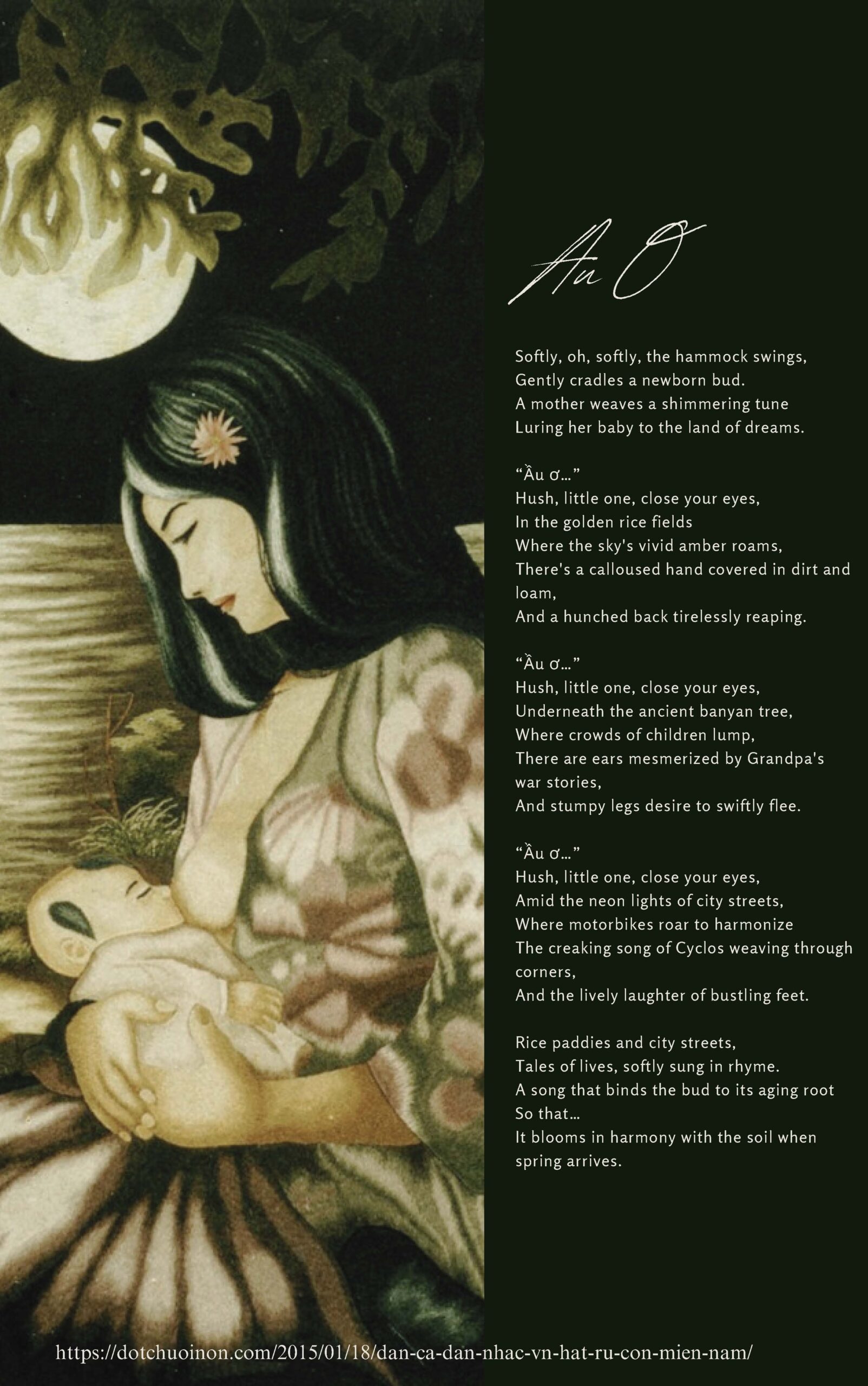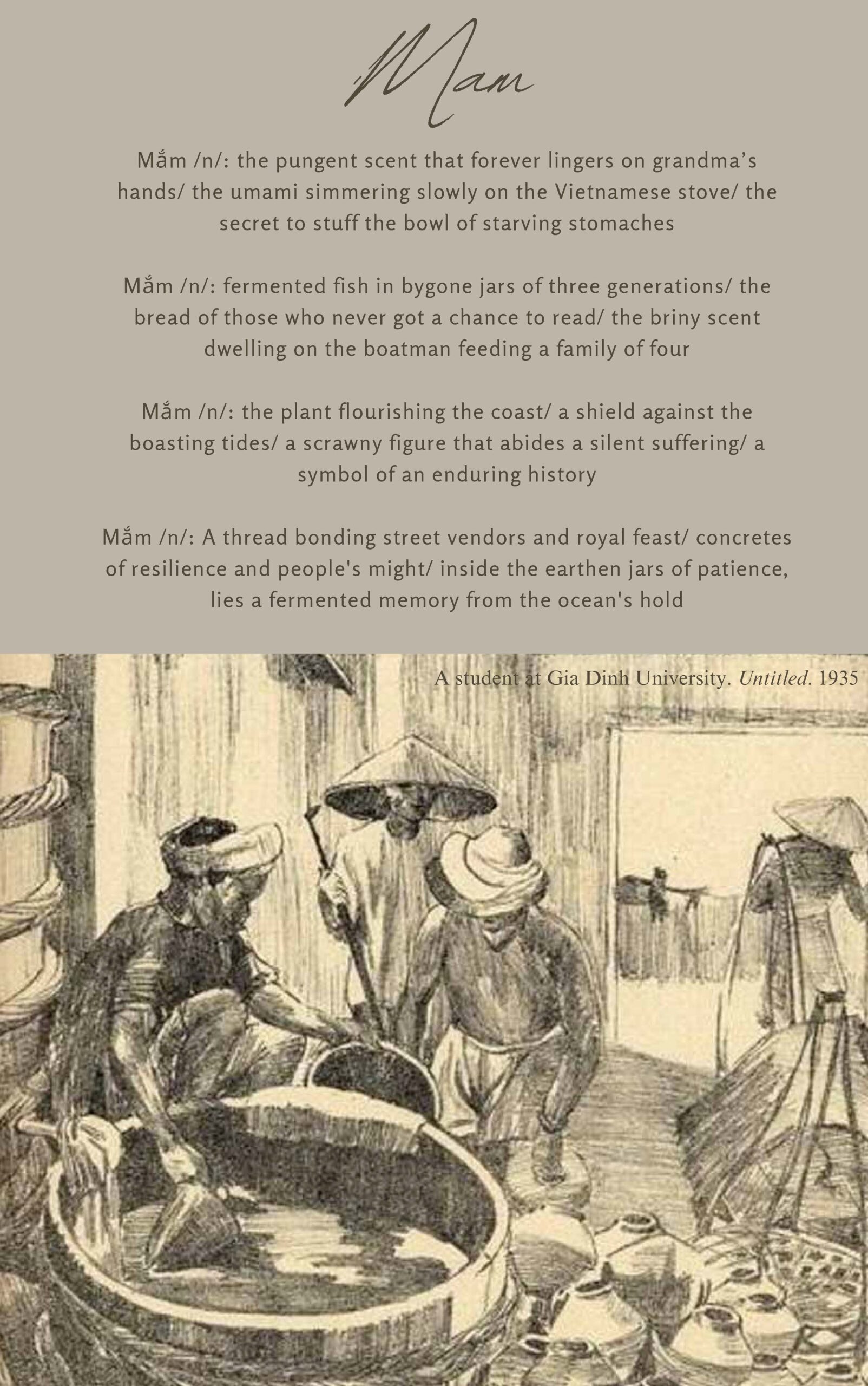When The Lotus Speaks,
Layla Thu Nguyen
Instructor’s Introduction
In WR 120: Storytelling, we investigate the human imperative to tell stories and explore how the stories we tell reflect, challenge, and script our identities, cultures, and traditions. The course’s final project is a creative one in which students go through the process of submitting a project proposal, leading their feedback critique, and revising their work so that it accomplishes the purpose they set via their chosen genre.
Layla’s “When the Lotus Speaks: A Collection of Vietnamese Sounds” is a series of love poems that celebrate the intimate music of the Vietnamese language. She artfully intertwines personal and collective memories with Vietnamese words, teaching us how to listen to the music of language which transcends mere definition. As she writes in her artist’s statement, “These poems are not a rejection of linguistic evolution, but a plea for balance and preservation.” Her poetry is a testament to the power of authorship, the noble drive to remember and celebrate our origins, and the powerful connection each of us has with our embodied experiences of our languages.
Carroll Beauvais
From the Writer
Language evolves. It persists as a testament to cultures’ boundless adaptability. But at its core, language is a bridge through which little parts of our minds are exchanged. As communication across vast distances has arguably never been easier, I witnessed firsthand the evolution of my mother tongue, Vietnamese. Digital vernaculars and the integration of foreign languages seamlessly blend into our everyday discourse, becoming almost instinctual. While it appears harmless at first sight, it gradually fosters a dissonance, especially among those who have intimately known the language in its “older” form for much of their lives. This linguistic evolution paradoxically creates a sense of alienation, undermining the essence of language in the first place. Therefore, I seek to recapture the beauty of my language through this collection of poems. Each poem serves as a vessel, transporting readers through the intricacy of Vietnamese expression. They are not a rejection of linguistic evolution but a plea for balance and preservation transcending time.
When The Lotus Speaks,
Artist Statement
I drew inspiration from Darrel Alejandro Holnes’ definition poem “ba•by” which intriguingly explores the multifaceted attributes of language. Poetry creates a space for abstraction and ambiguity within a limited length that aligns with Vietnamese’s indirect and intimate nature. Therefore, I chose to work with poems as they would evoke the essence of the language most effectively.
The first poem “Ầu ơ” imitates the traditional lullaby sung by older generations of Vietnamese to lure their infants into sleep. This lullaby not only conveys maternal affection but also illustrates the lifestyles prevalent in the rural areas of Vietnam. “Ầu ơ” is a phrase that mothers use to begin their lullaby therefore, I wanted it to be the opening poem that introduces readers to the Vietnamese culture. Given the term’s lack of a definitive meaning, I decided to exploit imageries of Vietnamese lives to exemplify the phrase’s impact within the lullaby’s context rather than attempting to define it directly. Additionally, I also incorporated the urban scenery which traditional lullabies wouldn’t have to foster the dynamic intercourse between modern and traditional cultures. Consequently, I was hoping that both older and younger generations could find resonance with the poem, tying back to my purpose of starting this project in the first place.
The second poem “Ơi” illustrates the intimate nature of the Vietnamese language. Vietnamese people use the phrase to both summon someone or answer someone’s call. The connotation of longing contributes to the phrase’s unique ability to bridge the emotional gap between strangers. Typically, its usage reflects not only a demonstration of respect but also an expression of hospitable intent towards the addressed individual. Therefore, I deliberately selected it to be my second poem to invite readers to engage with the poem on a deeper level. Furthermore, the phrase “Ơi” can be used in many contexts, making it ideal to highlight the multifaceted aspect of the Vietnamese language.
Similarly to the second poem, the third poem “Duyên” also serves to underscore the versatility of the language. I was struggling to define the phrase at first as it carries a lighter connotation compared to its English equivalent “fate.” Therefore, I did some research on instances when the phrase is commonly employed. Afterward, I decided that I could integrate contexts when the phrase would be used instead of strictly defining it. Through the crafting of the poem, I acknowledged that Vietnamese people tend to use the phrase in adverse circumstances. This tendency serves as a means to rationalize and alleviate the unfortunate of these circumstances. Perhaps, the phrase unveils the hypocrisy within the language, highlighting an underlying cultural sentiment.
The fourth poem “Thương” exemplifies the complexities within the expression of affection. “Thương” emerges as one of the loftiest orders in the Vietnamese spectrum of love. It encapsulates both love and sacrificial elements, thereby signifying a profound commitment between the speaker and the intended listener. I had a lot of trouble trying to define the phrase given my initial lack of familiarity with its implications. However, as I looked through past poems with the presence of the phrase, not only did I gain an increased understanding of its meaning, but I was also exposed to an additional layer of the phrase: an expression of empathy. Hence, this poem demonstrates the language’s depth and complexity.
I concluded the collection with “Mắm,” a shortened phrase for fish sauce which I believe is the keystone “species” in Vietnamese culture. By exploring different implications of “Mắm,” I intend to illuminate the integral roles this condiment plays in shaping the Vietnamese collective identity. Notably, it functions as a connective thread traversing various regions of Vietnam. You can try different Vietnamese dishes from North to South and still find a common aftertaste because of the unique presence of fish sauce. “Mắm” becomes the perfect ending to my poem collection. It functions as a vivid reminder of the cultural foundation that every Vietnamese identity originates from regardless of generational distinctions.
These poems are not a rejection of linguistic evolution but a plea for balance and preservation. I hope to ensure that the melody of Vietnamese continues to resonate transcending time.
Thu (Layla) Nguyen is a freshman pursuing a degree in Neuroscience at Boston University. As an international student and representative of the young generation, she encounters the complexity of navigating self-expression as a bilingual. Recognizing the relevance of this challenge in the diverse community she is living in, she seeks to address it for those who may share similar experiences. She would like to extend her gratitude to her WR120 professor, Caroll Beauvais, for the inspiration and invaluable support in crafting the poems.






